I want to bring our troops home as soon as possible. But the process should be driven by events on the ground in Iraq, not by arbitrary deadlines marked on a calendar in London.
It’s a great privilege to be here, and a pleasure to be in Pendle.
As you know, I am standing to become leader of the Liberal Democrats. I could certainly not avoid coming to a part of the country where we are so strong and where the roots of my party go deep into this community.
My parliamentary colleague, the Lord Greaves, is never afraid to mention at Westminster that our party runs the council and is facing up to difficult decisions.
And he will point out too that our party membership comes from all sections of this community. We still may not have got to the point where every opportunity is open to all in our society, but within our party there are no barriers to office.
That’s shown by the presence here today of our two North West MEPs, Sajjad Karim and Chris Davies, who work together in the European Parliament.
I want to make a few comments on the Middle East.
I was proud to be the Foreign Affairs Spokesman making the arguments in Parliament and the country against the Iraq war.
But the important thing now, for Iraq, and for Britain, is to look forward and to develop a coherent and achievable strategy to hold Iraq together and create the preconditions for the withdrawal of British troops.
This will not be easy.
We are still paying for the mistakes that have been made in the past three years:
for the failure to predict, and prepare for, the insurgency that followed;
for the failure to fill the power vacuum that emerged after disbanding the Iraqi security services;
and for the total failure to marginalise the spoilers, and to split them from the vast majority of Iraqis who want nothing more than to build a peaceful, prosperous and democratic Iraq;
Make no mistake.
I want to bring our troops home as soon as possible.
But I am clear that that process should be driven by events on the ground in Iraq, not by arbitrary deadlines marked on a calendar in London.
We have seen how my good friend Paddy Ashdown has managed this same process in a Muslim country much closer to home – in Bosnia.
There, the release of international money and the withdrawal of international troops were conditioned at every stage on real progress being made in strengthening the country’s democratic institutions.
The faster the Bosnian’s reformed, the quicker the international presence was wound down.
And the result?
We have been able to progressively reduce our troop presence from 60,000 at the end of the war to 6,000 today. And we have left behind us a stable, democratic state that is increasingly at ease with itself and at peace with its neighbours.
So it can be done. The task now, in Iraq, is to ensure that it is done.
I also hope that Hamas which won power in the recent elections in the Palestinian Authority will recognise the strength of the international call to renounce violence, recognise that Israel too has a right to exist and accept the roadmap to peace.
Israel is entitled to a secure and peaceful existence free from terrorist attack and within internationally recognised borders. But let’s be clear also the Palestinians are entitled to justice and a viable homeland. Peace will only come about when both exist.
That is a great prize – in all our interests – and for my part I want Britain to use our influence to further the cause of peace and progress.
In also want to applaud the contribution you all make as British Muslims to our society, our communities and our prosperity.
This contribution – which enriches us all – is not recognised or celebrated enough.
I hope that in a small way my visit today shows my commitment to you and my recognition of everything you do to make Britain a better country.



